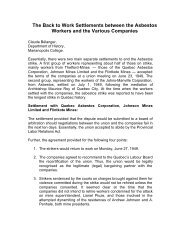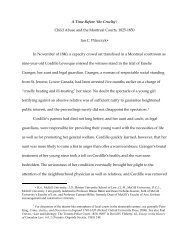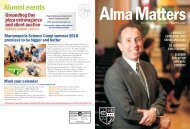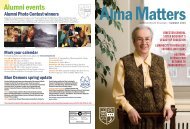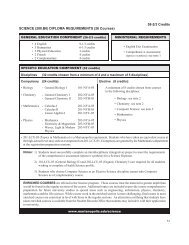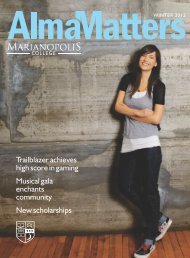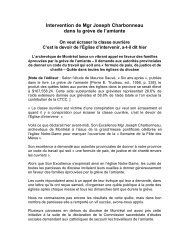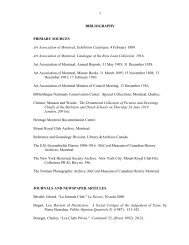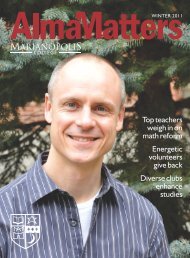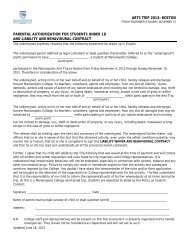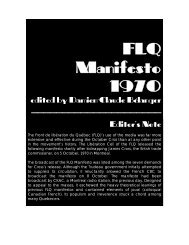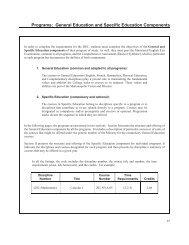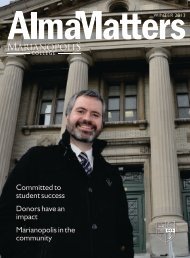2012-2013 Academic Year Calendar - Marianopolis
2012-2013 Academic Year Calendar - Marianopolis
2012-2013 Academic Year Calendar - Marianopolis
You also want an ePaper? Increase the reach of your titles
YUMPU automatically turns print PDFs into web optimized ePapers that Google loves.
MusicProfessional MusicProgram (551)The Music Program (501.A0),through a comprehensive series ofcourses, prepares a student foruniversity studies in music, as well asin a number of other fields.Music Program PrerequisitesEach applicant must have a preauditionand an audition and musthave completed or be completing oneof the following or their equivalents:In instrument or voice (minimumrequirement):– McGill Conservatory Secondary 5– Royal Conservatory of Music(RCM) Grade 8– Vincent-d’Indy Supérieur I– or equivalent.Having attained this level does notguarantee acceptance to <strong>Marianopolis</strong>.The audition at McGill is the majordetermining factor.(It is strongly recommended thatapplicants in piano or violin beat least one level higher.)In Theory and Ear Training:– McGill Conservatory Secondary 5– RCM Grade 2 Rudiments– Vincent-d’Indy 6 e année– or equivalent– (material in B. Wharram’sElementary Rudiments ofMusic), Music V (169502,669502)Applicants who have taken highschool music courses must make suretheir level of instrument/voice andtheory is equivalent to therequirements listed above. Privatelessons are highly recommended.All students are required to writeplacement tests in Theory and EarTraining. Students who are weak inthese areas may be advised to take asummer course.Applicants should contact the Officeof the Dean or the Coordinator ofMusic for a pre-audition.Ear Training and Theory I551-156-MS (3-1-2) 2 creditsThis course combines the componentsof Ear Training, Solfège, Writing, andAnalysis in one integrated course.Skills are developed in sight singingand dictation with emphasis onsinging and hearing intervalswithin the octave, scale and arpeggiopatterns, and triads in their variousformations. Also included aremelodic and rhythmic dictations andsinging exercises in simple and compoundmeters, in treble and bass clefs,and involving harmonic progressionsof elementary chords in root positionand inversions; aural recognition ofnonharmonic tones and cadences.The writing component of the coursebuilds on triads, and develops tofour-part tonal harmony involvingall degrees of the scale and theirinversions, including dominantand supertonic sevenths. Harmonicanalysis is made of these chords aswell as of nonharmonic tones inmusical literature. Skills aredeveloped in writing simple melodieswith cadences, and in analyzingmelodic and formal structures.Ear Training and Theory II551-256-MS (3-1-2) 2 creditsPrerequisite: 551-156-MSor equivalentThis course is a continuation of551-156-MS.Ear Training and Theory III551-356-MS (3-1-2) 2 creditsPrerequisite: 551-256-MSor equivalentThe Ear Training component of thiscourse involves recognition ofcompound intervals, chord qualityand position, seventh chords, chordprogressions on all degrees withinversions; notation of single-line andtwo-part melodies involving modulations,chords and inversions, moreadvanced rhythmic patterns, andsimple atonal material. The courseincludes singing of melodiesinvolving modulations to closelyrelated keys, using treble, bass, andalto clefs, and duet singing; vocalrealization of figured bass andseventh chords in close position; andsimple atonal material.As to the theory component, thecourse includes writing of four-partharmonizations from a given sopranoor figured bass involving simplemodulations, diatonic seventh chords,and secondary dominant and leadingtonechords. The course also coversharmonic analysis of the abovefeatures and more advanced melodicand structural analysis as well asproviding an introduction to counterpoint(continued in the last semester).91



